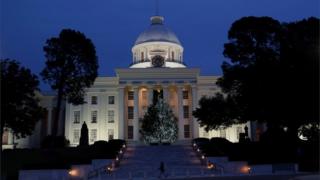Alabama to vote on bill banning abortion
Alabama lawmakers are expected to vote on a bill to outlaw abortion outright in the state, which would become the strictest such law in the US if passed.
The state Senate began debating the measure on Tuesday, and must decide whether to allow exemptions for cases of rape or incest.
The bill was passed 74-3 this month in the state House of Representatives.
Activists hope it will challenge a landmark Supreme Court ruling that legalised abortion in the US.
What next?
A final vote could come on Tuesday evening.
Republican Governor Kay Ivey has not said whether she would sign it, but she is seen as a strong opponent of abortion.
Democrats plan to mount a filibuster to block the bill, but have only eight seats in the 35-member chamber.
Republican lawmaker Terri Collins, sponsor of the legislation, said: “Our bill says that baby in the womb is a person.”
Democratic state Senator Bobby Singleton said the bill “criminalises doctors” and is an attempt by men “to tell women what to do with their bodies”.
As the Senate debated whether to an exception for rape and incest, Democrat Rodger Smitherman said: “We’re telling a 12 year old girl who, through incest and rape is pregnant and we are telling her that she doesn’t have a choice.”
What does the bill do?
It goes further than legislation passed recently elsewhere in the US to ban abortion after a foetal heartbeat can be detected, usually around six weeks into a pregnancy.
Under the Alabama measure, provision of abortion at any stage in pregnancy would be a class A felony.
Doctors could face 10 years in prison for attempting to terminate a pregnancy and 99 years for actually carrying out the procedure.
A woman who receives an abortion would not be held criminally liable.
The bill would allow abortion in cases where the mother’s life is at serious risk.
Its text says more foetuses have been aborted than people killed in “Stalin’s gulags, Cambodian killing fields”.
Why now?
Supporters of the legislation have welcomed an inevitable challenge in federal court if the measure becomes law.
The bill’s architects expect it will be defeated in the lower courts, but hope it will end up before the Supreme Court.
Their aim ultimately is to overturn Roe v Wade, the 1973 ruling that recognised a woman’s constitutional right to end a pregnancy.
Emboldened by the addition of two Trump-nominated conservative justices, anti-abortion activists are eager to take one of the most divisive issues in America back to the highest court in the land.
Eric Johnston, founded the Alabama Pro-Life Coalition that helped draft the bill, told NPR: “The dynamic has changed.
“The judges have changed, a lot of changes over that time, and so I think we’re at the point where we need to take a bigger and a bolder step.”
What’s the national picture?
If signed, the Alabama measure would become one of more than 300 laws challenging abortion access in the US.
Its passage comes amid a wave of anti-abortion measures in Republican-controlled state capitols around the nation.
Legislation to restrict abortion has been introduced in 16 of America’s 50 states this year alone, according to the Guttmacher Institute, which advocates for more abortion access.
The flurry of measures has led these activists to warn that a swathe of US territory could become an “abortion desert.”
At the other end of the political spectrum, a Democratic-sponsored bill in Virginia that would have allowed third-trimester abortions up until the point of childbirth failed to make it out of committee.
Source: Read Full Article



